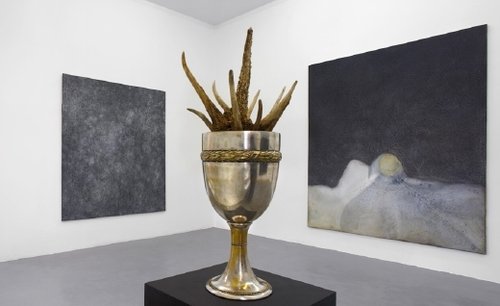Jan Koch
dal 4/9/2008 al 10/10/2008
Segnalato da
4/9/2008
Jan Koch
Galerie Jette Rudolph, Berlin
Boseistswennsnichtweiter

Jan Koch (b. 1978 in Mönchengladbach), in his first solo show at gallery
Jette Rudolph, presents his newest works featuring both small and large
formatted paintings as well as sculpture. He dedicates purity and
reduction of geometrical form to an added philosophical dimension.
The title “böseistswennsnichtweiter“ brings together collective themes
reflected within the exhibited works: Abstraction, Nihilism and the
symbolic…
The square and circle (dot) are pivotal to the motifs figured in the works
of Jan Koch. A similar formal reduction can also be found in the works of
the Russian Suprematists, specifically Malewitsch; Bauhaus, the Dutch
DeStijl or the later Minimal Art. What is on the one hand a formulation of
a universal language as well as putting forward the idea of the serial; it
is the concept of tautology which Jan Koch employs within his works to
create from the “smallest form (…) an arbitrary system” [J. Koch]. This
translates itself from the object to the canvas.
The strict reduction of form- interpreted by Malewitsch as the “zero point
of art”- does not target the mathematically calculated, instead it
concerns itself with the spiritual in its purest form and the experience
which articulates itself in the “purest obliteration of matter in the
empty white of non-existence” (Johannes Meinhardt, Ende der Malerei und
Malerei nach dem Ende der Malerei, Hatje Cantz Verlag, Ostfildern, 1997).
Through the form of the cross and the square, Jan Koch is able to fuse the
two-dimensional into the three-dimensional; to the object. According to J.
Albers: “the square, with its four equal sides refers to a top, a bottom,
east and west”. With this in mind, Christian-mythological symbols combined
with an objective grounding are repeatedly displayed within the canvases
of Jan Koch. The cross-motif, whose origin is based in icon(ic) painting,
resurfaces within Koch’s works- however with a ritualistic handling of the
third form of abstraction.
The deliberate as well as the conscious is set in contrast to the idea of
the unconscious and the process of the incidental- Jan Koch subjects the
surface of the canvas to chemical substances such as Chloride or sandpaper
in order to partially erode the concrete form as well as to create a break
within the rigidity of the geometric shapes. At the same time, the
restriction of Koch’s palette harmonises the natural tone of the canvas
with the purity of form.
His mirrored cube is reminiscent of the minimalist sculpture of Robert
Morris, 1965 “untitled”, yet through the installation of neon pipes within
the body of the work, Koch evokes an additional dimension: the play of
light. The intangible quality of light, as well as the reflection of
reality (the surrounding environment), appears to alleviate the boundaries
of form.
The material and the immaterial oscillate between each other by way of the
construction/ placement of the object, simultaneously experiencing the
incidental. The constellation and construction of the cube leads to an
autonomous realisation of the art work. The distance to the viewed object
is reduced, up-scaled and transformed from a two-dimensionally recognised
image to a three-dimensional sculpture. The interplay between the natural
and the artificially created effect; between the deliberate and the
accidental; between reduction and increased dimension result in the
pivotal motifs featured in the newest works of Jan Koch.
Opening: Friday 5th September, from 6: 30 pm to 22 pm
Galerie Jette Rudolph
Zimmerstrasse 90-91 - Berlin
open: Tues- Sat 11.30 am- 6 pm
Free admission



